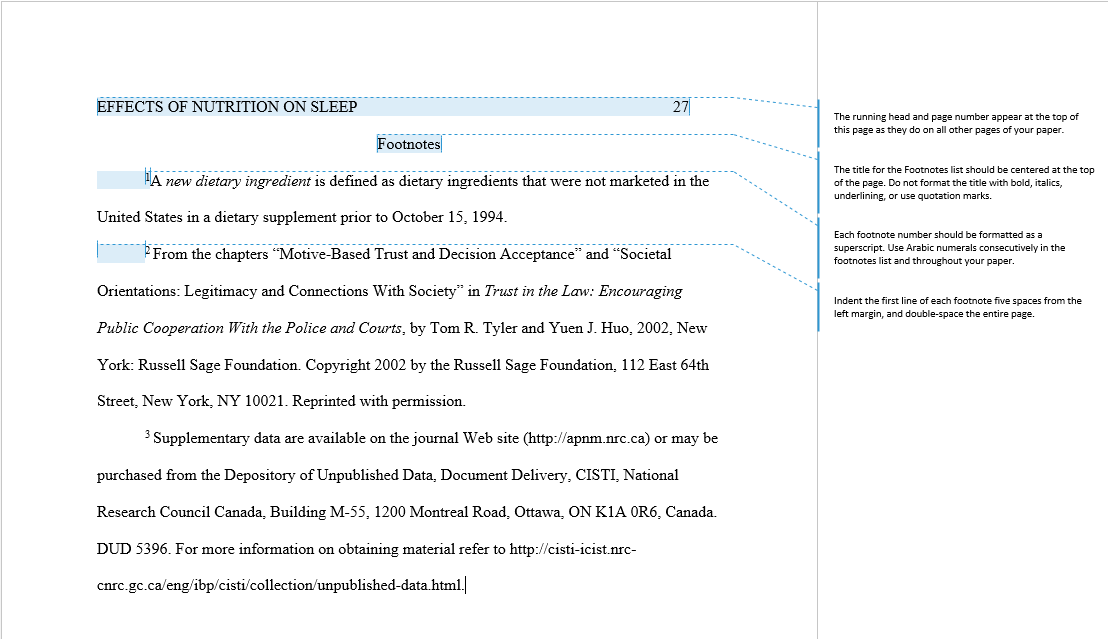
When should footnotes be used?
The APA suggests two instances in which footnotes may be used:
- Content Footnotes: to offer further information on a topic that is not directly related to the text. As content footnotes should be concise, avoid writing lengthy paragraphs or including extraneous information.
- Copyright Permission Footnotes: to cite adapted or reprinted materials in the paper, especially data sets, tables, and quotations that exceed 400 words. Consult the APA Publication Manual (6th ed.) for more information about copyright permissions.
It is recommended to refrain from extensive usage of footnotes as this practice may distract or confuse readers. When applicable, incorporate additional information in the main text of the paper, but avoid inserting irrelevant material. Footnotes should briefly present the reader with meaningful information that enhances your argument.
How should footnotes be formatted?
Footnotes may be displayed in one of two ways:
- Listed at the bottom of the relevant page
- Assembled altogether on a new page, following the References page(s)
If the footnotes are compiled on a separate page, the title “Footnotes” should be centered at the top of the page. Avoid formatting the title with bold, italics, underlining, or quotation marks. Indent the first line of each footnote five spaces from the left margin, and double-space the entire page. Each footnote number should be formatted as a superscript, and should be situated after all punctuation marks excluding a long dash (—).
Let’s look at some examples of using footnotes in a sentence:
- Example 1 – Content Footnote: “Under the DSHEA (1994), dietary supplements no longer receive approval from the FDA before being marketed unless the supplement contains a new dietary ingredient.1 ”
1A new dietary ingredient is defined as dietary ingredients that were not marketed in the United States in a dietary supplement prior to October 15, 1994.
- Example 2 – Content Footnote: “The questionnaire (see Supplementary material3) was comprised of 4 parts: student perception regarding content of nutrition education; duration of time spent on nutrition education; preferred education approach to nutrition; and demographics.”
3Supplementary data are available on the journal Web site ) or may be purchased from the Depository of Unpublished Data, Document Delivery, CISTI, National Research Council Canada, Building M-55, 1200 Montreal Road, Ottawa, ON K1A 0R6, Canada. DUD 5396.
- Example 3 – Copyright Permission Footnote: “Trust in authority was measured using four items drawn from models of motive-based trust (Tyler & Huo, 2002).2”
2From the chapters “Motive-Based Trust and Decision Acceptance” and “Societal Orientations: Legitimacy and Connections With Society” in Trust in the Law: Encouraging Public Cooperation With the Police and Courts, by Tom R. Tyler and Yuen J. Huo, 2002, New York: Russell Sage Foundation. Copyright 2002 by the Russell Sage Foundation, 112 East 64th Street, New York, NY 10021. Reprinted with permission.
Compiling footnotes at the end of your paper
Below is an example of how you might format your footnotes if you compile them on a separate page at the end of your paper.
For more information about referencing sources in APA:
[1] Dodge, T., & Kaufman, A. (2007). What makes consumers think dietary supplements are safe and effective? The role of disclaimers and FDA approval. Health Psychology, 26(4), 513-517. doi:10.1037/0278-6133.26.4.513
[2] Gramlich, L. M., Olstad, D., Nasser, R., Goonewardene, L., Raman, M., Innis, S., & … Roy, C. (2010). Medical students’ perceptions of nutrition education in Canadian universities. Applied Physiology, Nutrition & Metabolism, 35(3), 336-343. doi:10.1139/H10-016
[3] De Cremer, D., & Tyler, T. R. (2007). The effects of trust in authority and procedural fairness on cooperation. Journal of Applied Psychology, 92(3), 639-649. doi:10.1037/0021-9010.92.3.639





















